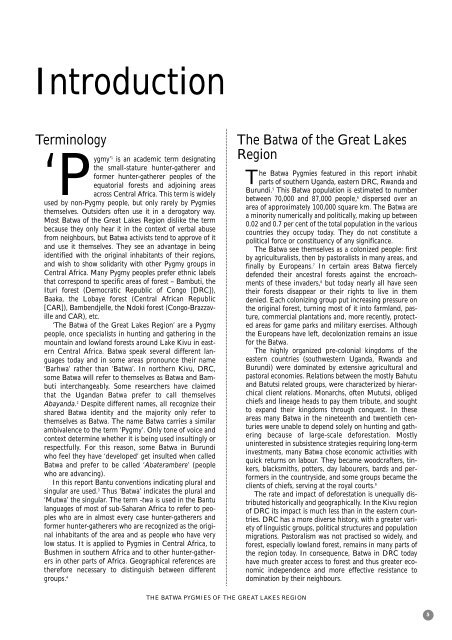The Batwa Pygmies of the Great Lakes Region - UNHCR
The Batwa Pygmies of the Great Lakes Region - UNHCR
The Batwa Pygmies of the Great Lakes Region - UNHCR
Create successful ePaper yourself
Turn your PDF publications into a flip-book with our unique Google optimized e-Paper software.
Introduction<br />
Terminology<br />
‘Pygmy’ 1 is an academic term designating<br />
<strong>the</strong> small-stature hunter-ga<strong>the</strong>rer and<br />
former hunter-ga<strong>the</strong>rer peoples <strong>of</strong> <strong>the</strong><br />
equatorial forests and adjoining areas<br />
across Central Africa. This term is widely<br />
used by non-Pygmy people, but only rarely by <strong>Pygmies</strong><br />
<strong>the</strong>mselves. Outsiders <strong>of</strong>ten use it in a derogatory way.<br />
Most <strong>Batwa</strong> <strong>of</strong> <strong>the</strong> <strong>Great</strong> <strong>Lakes</strong> <strong>Region</strong> dislike <strong>the</strong> term<br />
because <strong>the</strong>y only hear it in <strong>the</strong> context <strong>of</strong> verbal abuse<br />
from neighbours, but <strong>Batwa</strong> activists tend to approve <strong>of</strong> it<br />
and use it <strong>the</strong>mselves. <strong>The</strong>y see an advantage in being<br />
identified with <strong>the</strong> original inhabitants <strong>of</strong> <strong>the</strong>ir regions,<br />
and wish to show solidarity with o<strong>the</strong>r Pygmy groups in<br />
Central Africa. Many Pygmy peoples prefer ethnic labels<br />
that correspond to specific areas <strong>of</strong> forest – Bambuti, <strong>the</strong><br />
Ituri forest (Democratic Republic <strong>of</strong> Congo [DRC]),<br />
Baaka, <strong>the</strong> Lobaye forest (Central African Republic<br />
[CAR]), Bambendjelle, <strong>the</strong> Ndoki forest (Congo-Brazzaville<br />
and CAR), etc.<br />
‘<strong>The</strong> <strong>Batwa</strong> <strong>of</strong> <strong>the</strong> <strong>Great</strong> <strong>Lakes</strong> <strong>Region</strong>’ are a Pygmy<br />
people, once specialists in hunting and ga<strong>the</strong>ring in <strong>the</strong><br />
mountain and lowland forests around Lake Kivu in eastern<br />
Central Africa. <strong>Batwa</strong> speak several different languages<br />
today and in some areas pronounce <strong>the</strong>ir name<br />
‘Barhwa’ ra<strong>the</strong>r than ‘<strong>Batwa</strong>’. In nor<strong>the</strong>rn Kivu, DRC,<br />
some <strong>Batwa</strong> will refer to <strong>the</strong>mselves as <strong>Batwa</strong> and Bambuti<br />
interchangeably. Some researchers have claimed<br />
that <strong>the</strong> Ugandan <strong>Batwa</strong> prefer to call <strong>the</strong>mselves<br />
Abayanda. 2 Despite different names, all recognize <strong>the</strong>ir<br />
shared <strong>Batwa</strong> identity and <strong>the</strong> majority only refer to<br />
<strong>the</strong>mselves as <strong>Batwa</strong>. <strong>The</strong> name <strong>Batwa</strong> carries a similar<br />
ambivalence to <strong>the</strong> term ‘Pygmy’. Only tone <strong>of</strong> voice and<br />
context determine whe<strong>the</strong>r it is being used insultingly or<br />
respectfully. For this reason, some <strong>Batwa</strong> in Burundi<br />
who feel <strong>the</strong>y have ‘developed’ get insulted when called<br />
<strong>Batwa</strong> and prefer to be called ‘Abaterambere’ (people<br />
who are advancing).<br />
In this report Bantu conventions indicating plural and<br />
singular are used. 3 Thus ‘<strong>Batwa</strong>’ indicates <strong>the</strong> plural and<br />
‘Mutwa’ <strong>the</strong> singular. <strong>The</strong> term -twa is used in <strong>the</strong> Bantu<br />
languages <strong>of</strong> most <strong>of</strong> sub-Saharan Africa to refer to peoples<br />
who are in almost every case hunter-ga<strong>the</strong>rers and<br />
former hunter-ga<strong>the</strong>rers who are recognized as <strong>the</strong> original<br />
inhabitants <strong>of</strong> <strong>the</strong> area and as people who have very<br />
low status. It is applied to <strong>Pygmies</strong> in Central Africa, to<br />
Bushmen in sou<strong>the</strong>rn Africa and to o<strong>the</strong>r hunter-ga<strong>the</strong>rers<br />
in o<strong>the</strong>r parts <strong>of</strong> Africa. Geographical references are<br />
<strong>the</strong>refore necessary to distinguish between different<br />
groups. 4<br />
THE BATWA PYGMIES OF THE GREAT LAKES REGION<br />
<strong>The</strong> <strong>Batwa</strong> <strong>of</strong> <strong>the</strong> <strong>Great</strong> <strong>Lakes</strong><br />
<strong>Region</strong><br />
<strong>The</strong> <strong>Batwa</strong> <strong>Pygmies</strong> featured in this report inhabit<br />
parts <strong>of</strong> sou<strong>the</strong>rn Uganda, eastern DRC, Rwanda and<br />
Burundi. 5 This <strong>Batwa</strong> population is estimated to number<br />
between 70,000 and 87,000 people, 6 dispersed over an<br />
area <strong>of</strong> approximately 100,000 square km. <strong>The</strong> <strong>Batwa</strong> are<br />
a minority numerically and politically, making up between<br />
0.02 and 0.7 per cent <strong>of</strong> <strong>the</strong> total population in <strong>the</strong> various<br />
countries <strong>the</strong>y occupy today. <strong>The</strong>y do not constitute a<br />
political force or constituency <strong>of</strong> any significance.<br />
<strong>The</strong> <strong>Batwa</strong> see <strong>the</strong>mselves as a colonized people: first<br />
by agriculturalists, <strong>the</strong>n by pastoralists in many areas, and<br />
finally by Europeans. 7 In certain areas <strong>Batwa</strong> fiercely<br />
defended <strong>the</strong>ir ancestral forests against <strong>the</strong> encroachments<br />
<strong>of</strong> <strong>the</strong>se invaders, 8 but today nearly all have seen<br />
<strong>the</strong>ir forests disappear or <strong>the</strong>ir rights to live in <strong>the</strong>m<br />
denied. Each colonizing group put increasing pressure on<br />
<strong>the</strong> original forest, turning most <strong>of</strong> it into farmland, pasture,<br />
commercial plantations and, more recently, protected<br />
areas for game parks and military exercises. Although<br />
<strong>the</strong> Europeans have left, decolonization remains an issue<br />
for <strong>the</strong> <strong>Batwa</strong>.<br />
<strong>The</strong> highly organized pre-colonial kingdoms <strong>of</strong> <strong>the</strong><br />
eastern countries (southwestern Uganda, Rwanda and<br />
Burundi) were dominated by extensive agricultural and<br />
pastoral economies. Relations between <strong>the</strong> mostly Bahutu<br />
and Batutsi related groups, were characterized by hierarchical<br />
client relations. Monarchs, <strong>of</strong>ten Mututsi, obliged<br />
chiefs and lineage heads to pay <strong>the</strong>m tribute, and sought<br />
to expand <strong>the</strong>ir kingdoms through conquest. In <strong>the</strong>se<br />
areas many <strong>Batwa</strong> in <strong>the</strong> nineteenth and twentieth centuries<br />
were unable to depend solely on hunting and ga<strong>the</strong>ring<br />
because <strong>of</strong> large-scale deforestation. Mostly<br />
uninterested in subsistence strategies requiring long-term<br />
investments, many <strong>Batwa</strong> chose economic activities with<br />
quick returns on labour. <strong>The</strong>y became woodcrafters, tinkers,<br />
blacksmiths, potters, day labourers, bards and performers<br />
in <strong>the</strong> countryside, and some groups became <strong>the</strong><br />
clients <strong>of</strong> chiefs, serving at <strong>the</strong> royal courts. 9<br />
<strong>The</strong> rate and impact <strong>of</strong> deforestation is unequally distributed<br />
historically and geographically. In <strong>the</strong> Kivu region<br />
<strong>of</strong> DRC its impact is much less than in <strong>the</strong> eastern countries.<br />
DRC has a more diverse history, with a greater variety<br />
<strong>of</strong> linguistic groups, political structures and population<br />
migrations. Pastoralism was not practised so widely, and<br />
forest, especially lowland forest, remains in many parts <strong>of</strong><br />
<strong>the</strong> region today. In consequence, <strong>Batwa</strong> in DRC today<br />
have much greater access to forest and thus greater economic<br />
independence and more effective resistance to<br />
domination by <strong>the</strong>ir neighbours.<br />
5

















